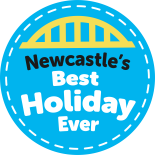Key

Offers free childcare
Part of our local offer
Best Holiday Ever
Free Service
Can't find what you're looking for? Try using quotes.
Are you looking after someone who needs help and support?
If you are caring for someone who cannot manage without your support and you're not employed to do this, then you are a carer. Anyone can become a carer at any point in their life. We're here to listen and support you.
Newcastle Carers is an independent charity supporting adults, children, and young people who look after someone living in Newcastle upon Tyne. Our services are free, confidential and non-judgemental, helping carers find ways to make their caring situation easier to manage.


Skills for People helps disabled children and adults and their families to be in control and to have better lives. We also work with children with special educational needs.
We offer help with planning, meeting other disabled people and their families, advocacy, advocacy groups, social activities, self help meetings and individual development. We work with people who have an individual budget and those who do not.


Children North East exists because growing up can be hard. We want all babies, children and young people to be happy and healthy and to grow up feeling:
-
Safe and loved
-
Resilient to the challenges they may face
-
Valued and confident
We have a strong children’s rights ethos and believe that real social change is achieved when those who are, or have, experienced issues lead the change.

For over 35 years we've led the way in providing specialist care, education and services for children, young people and adults with autism, across the North-east of England.
Recognised for our innovation and excellence, everything we do stems from an unswerving belief in providing bespoke person-centered support. It’s at the heart of who we are to recognise the uniqueness of every human being, and to understand that as a spectrum condition no two people with autism will have the same needs or wants.

Family Fund supports families living across the UK who are who are raising a disabled or seriously ill child or young person up to the age of 17. Our support is focused on those on low incomes with a child/children who have a high level of additional support needs.
At Family Fund, we believe that all families raising disabled or seriously ill children and young people should have the same choices, quality of life, opportunities and aspirations as other families.

Nystagmus Network is a charity that helps people with nystagmus, a condition where the eyes move uncontrollably. They offer many services to support families and children with nystagmus.
Support Services

Inclusion North promotes the inclusion of people with learning disabilities, their families and carers.
The world is a better place when people with learning disabilities are included in everything.
We try to make this happen by:

For brothers and sisters of disabled children and adults
Sibs is a UK charity for siblings who may be finding it hard to cope with a brother or sister who is disabled, has special educational needs or a serious long term condition.
It is the only UK charity representing the needs of over half a million young siblings and over one and a half million adult siblings.
Sibs can give information and advice both over the phone and online. Sibs also runs YoungSibs, an online only support service for siblings in the UK aged 7 to 17.


Retina UK is the national charity for families living with inherited retinal dystrophies. We fund research and provide information and support to those affected by inherited sight loss and the professionals who support them.
We support anyone with the following visual impairments: Retinitis Pigmentosa (RP), Rod Cone dystrophy, Cone Rod dystrophy, Choroideremia, Leber congenital amaurosis (LCA), Bardet-Biedl syndrome (BBS), Usher syndrome, Stargardt disease.

This Facebook group is for local parents of disabled children and young people. Once you join you can ask other parents about problems you are having and where to get help and share your experiences with one another.
This page also provides information on activities happening locally including coffee mornings and drop in events.
To find out what is happening, check out the flyers featured on their Facebook group and socials:

The Access Fund is a grant scheme. It can help children and young people with educational needs and/or disabilities take part in activities within their community alongside their non-disabled peers. It can help with the cost of taking part in local activities. This may include but is not limited to sporting, performing arts, or recreational activities.
Who is eligible to apply?


Are you aged 18-25 and looking after someone who needs help and support?
If you are caring for someone who cannot manage without your support and you're not employed to do this, then you are a young adult carer. Anyone can become a carer at any point in their life. We're here to listen and support you.


Our Story
Daisy Chain provides a range of support services to autistic children and adults, either with a diagnosis or who are undergoing the diagnostic process, their parents/carers and their siblings.
Daisy Chain began life in 2003 as the dream of its founder, Lesley Hanson, whose son Jacob was diagnosed as autistic at an early age.

Youth Link Newcastle is for young people living with a disability or additional needs. It matches young people to a peer mentor. They can help with working towards a goal and overcoming challenges.
The service is available to young people living in a Newcastle Postcode, aged from 11 to 18.
Some examples of how a peer mentor could help you include:

Run by the NSPCC, Childline is a free, private and confidential service where children and young people under the age of 19. This includes those with additional needs or disabilities. You can talk to a counsellor about any issue they’re facing.
Online, on the phone, anytime.

Newcastle Parent Carer Forum (PCF) are a group of volunteer parents and carers who work in partnership with Newcastle Local Authority, Health, Education and Social Care providers to make sure that the services they deliver meet the needs of children, young people and their families.
We aim to act as “the voice” of Newcastle’s parents and carers of children and young people with Special Educational Needs and Disabilities (SEND).

Serving hot breakfasts, lunchtime favourites and top-quality coffee. Cafe Hope Cowgate is a place for families and people from the local community to enjoy affordable meals in a friendly space. Based at our Cowgate Centre site, its profits help keep our life-changing services accessible to babies, children, young people and their families.

The North East Autism Society run a Family Networking Group, a closed group on Facebook which aims to empower, educate and connect parents, families and carers by:
-
Increasing knowledge
-
Sharing useful information
-
Connecting people
You can find out more here: Family Networking - North East Autism Society

EarlyBird is a course for parents who have a child under 5 with a diagnosis of autism. It is a 10-week course consisting of 8 face to face group sessions and 2 home visits.
The programme aims to support parents post diagnosis and establish good practice in supporting their child at an early age.

A course to help parents/carers manage the behaviour of people with learning disabilities and/or autism. It will help you understand their behaviour and ways to support them.
Find out more about Positive Behaviour Support here: Positive Behavioural Support
For more information about this course, call 0191 281 8737 or email information@skillsforpeople.org.uk.

NEAS Newcastle Autism Hubs are a supportive environment for parents and carers of autistic children. Currently these hubs offer:
-
one-to-one sessions where families can discuss any issues in confidence
-
workshops designed to help parents understand and support their autistic children.
The workshops cover topics such as common misconceptions, differences in autistic children, and practical strategies for everyday life.

Contact is the UK charity for families with disabled children. They support families, bring families together and help families take action for others. They give support through:

